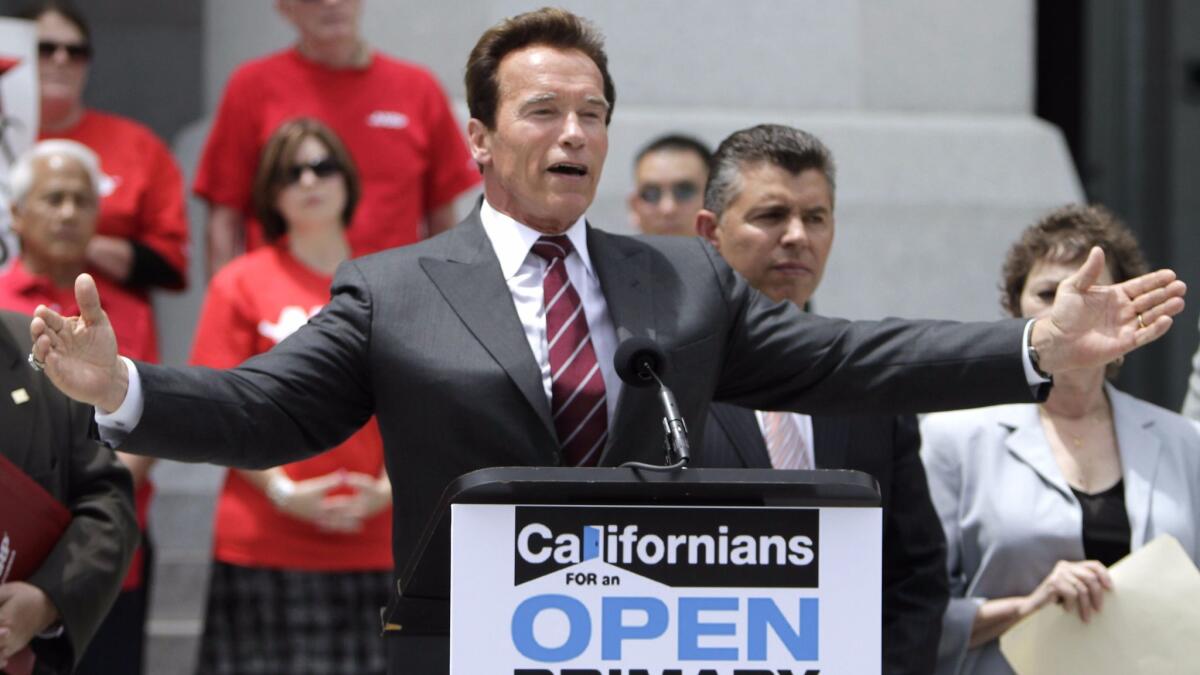Column: The political parties would like voters to kill California’s top-two primary system in 2018

Reporting from Sacramento — Political parties and open primaries are the electoral equivalent of oil and water. They may coexist, but they don’t mix.
So it’s hardly surprising that neither California’s dominant Democrats nor its fading Republicans have ever really embraced Proposition 14, the sweeping ballot measure that abolished partisan primaries six years ago.
Some, in fact, say they’ve seen enough. It’s time to scrap it.
“If we don’t get California straightened out for every party, at least give them some kind of chance, then why the hell are we involved in politics at all?” asks Tom Palzer, a Republican from Rancho Cucamonga.
Palzer, who recently launched his second straight long-shot bid for the U.S. Senate, is the author of a proposed ballot initiative for November 2018 that would wipe out the top-two primary. It would restore the role of parties in picking who’s on the ballot in California’s general elections.
While he’s an activist who’s largely been doing this on his own, Palzer’s effort was crafted at the same time rumors swirled in Sacramento this summer of powerful political groups hoping to do the same thing. That effort, in a perfect world, would have produced an initiative which included “reform” items like new campaign money rules while also repealing the top-two primary. But in an unusually quiet ballot measure year, it never materialized. And it would surely have been fought by self-styled good government groups.
The original champion of the top-two primary, former Gov. Arnold Schwarzenegger, called its passage “a clear message that Californians are tired of partisan gridlock and dysfunction” the day after the June 2010 election. The promise was that it would help centrist candidates beat out ideologues.
Its impact has been “inconsistent,” concluded an April study co-written by Eric McGhee, a researcher at the nonpartisan Public Policy Institute of California. Perhaps the state’s leading expert on the top-two primary, McGhee believes there’s only been a slight increase in moderates (all Democrats) elected to the Legislature. Even then, the state’s independent redistricting rules and the 2012 revamping of legislative term limits may deserve just as much credit.
“To the extent that they can be known, the causes of that greater moderation seem to be about evenly split” among all three of those changes, McGhee said.
Political Road Map: Lawmakers in Sacramento are in a dash to collect cash for their campaigns »
The only undisputed winners in changing the primary rules have been unaffiliated “independent” voters, who used to be banned by some parties from voting in their primaries. Now there’s one large slate of candidates, and everyone can vote for anyone.
It’s also unleashed a torrent of campaign spending, mostly by independent political action committees that raise money in unlimited amounts.
“This has become a special interest boondoggle,” said Shawnda Westly, a Democratic strategist and former leader of the state party.
An analysis by the nonpartisan California Target Book shows that independent committees spent more than $29 million on legislative races in 2016, much of which came from business and education groups.
“Overwhelmingly, California’s voters want money out of politics,” Westly said. “The only thing top-two did was expand its role.”
Given their dominance, perhaps it’s not surprising that almost all of the money is being spent on fights pitting one Democrat against another — the kind that rattle the party’s liberal base and reinforce the notion that Republicans are a political afterthought.
It’s a change that’s diminished political parties, Palzer said. “I want parties to be healthy,” he said. “Why are we cutting off the parties at the knees?”
Whether he can raise enough money to bring that debate to next year’s ballot remains to be seen. So, too, is whether California’s well-publicized reshaping of its elections has come up short, or if some change was better than no change.
Follow @johnmyers on Twitter, sign up for our daily Essential Politics newsletter and listen to the weekly California Politics Podcast
ALSO:
Political Road Map: Knowing who is (and isn’t) legally registered to vote in California
Updates on California politics
More to Read
Get the L.A. Times Politics newsletter
Deeply reported insights into legislation, politics and policy from Sacramento, Washington and beyond. In your inbox three times per week.
You may occasionally receive promotional content from the Los Angeles Times.











